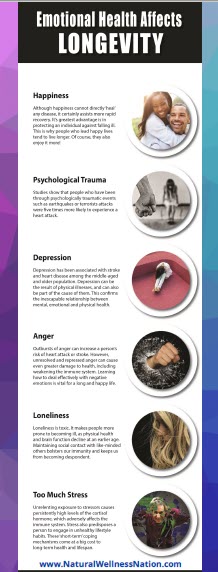Yes, you can improve your chances of a long life – that is, achieve greater longevity – if you work on optimizing your mental and emotional health.
Have you ever heard of a woman who found out that she had cancer, and instead of succumbing to her unfortunate situation, she spent most of her days watching comedy films? Months later, she was pleasantly surprised to learn that her tumors had gone.
There are many anecdotes about how positivity has turned things around for those who are dealing with health issues, even terminal ones like cancer. Today, many scientific studies are also showing evidence that emotional health can affect a person’s physical health and longevity.
Studies have found that those who have mental health issues, such as schizophrenia and depression, are more likely to develop chronic illnesses, such as heart diseases. Conversely, people who are generally positive tend to live longer than expected.
How Does Mental Health Affect Your Longevity?
When you are dealing with negative emotions, you tend to neglect your physical well-being. You fail to exercise; you don’t seek professional help; you indulge more in unhealthy activities like drinking and smoking. Consequently, those actions can cause or worsen physical health issues, such as cardiovascular diseases, diabetes, and cancer.
Grief
Losing a loved one is one of the hardest things people go through. Many people are able to grieve for a while, then move on to acceptance, and then are able to go on with their life. For older people, however, especially those who lose a spouse, grief can have more adverse effects than we can imagine.
You have probably heard of a senior who died just a few months after burying his or her spouse. They often go through feelings of isolation, loneliness, and depression. Those negative emotions and mental states can manifest in their physical health, such as a weak immune system. They become more prone to infection, and as they continue to deal with the negative feelings, their conditions progressively worsen.
Anxiety
We also have bad days, and some of them feel like they are as bad as they can get. Negative experiences tend to make us anxious about our future and regretful of our past – what might happen, and what could have been. Those lists can go on. Those feelings—the stress, anxiety, and constant worrying—can lead to a decrease in our life expectancy. When you can’t handle your frustrations well, you tend to resort to unhealthy habits, which then lead to a lower quality of life, and reduce your life expectancy.
Social Isolation and Loneliness
Many people enjoy being alone, and that’s fine. We all have the urge to spend time with ourselves from time to time, to reflect on life or just do the things we want to. However, research has shown that social isolation and loneliness can increase mortality risks. While feeling alone is different from your choice of being alone, studies have found that the effect on your longevity is just the same.
When you lack social interaction and are always lonely, you tend to have a weaker immune system and higher levels of stress hormones. At the same time, you are less likely to be physically active when you’re on your own. All these can lead to physical health issues, such as heart issues, obesity, stroke, and sleep disturbances.
Positive Emotions are Powerful
While negative emotions can cut many years from your life expectancy, positive emotions can do the opposite. Studies have shown that optimistic people and those who are satisfied and happy with their lives tend to have a longer life.
When you realize that your life is full of negativity or that your mental health is not in its best shape, it’s time to make a shift. Start to look at the brighter side of everything. One thing you can practice is forgiveness.
When people have hurt you, or something happened that you feel has scarred you for life, you can easily often dwell on the negative emotions that surround it. Forgiveness is one of the keys to help you resolve the negativity of the situation. When you forgive, you relinquish all the negativity that comes with it. Studies show that forgiveness, be it to others or to yourself, can help you strengthen your immune system and lengthen your lifespan.
If mental issues can affect your physical well-being, physical health can also affect your mental condition. As such, doing healthy physical activities, such as exercise, can also help improve your mental health. Exercise can help your brain to produce happy hormones, so your emotional well-being also improves.
The Take-Home Point
Our mental health status is one of the things that can help us live longer. When we are mentally healthy, we are better able to take care of our physical well-being. In turn, we keep ourselves healthy, and when we’re healthy, we can live longer and enjoy it more.








